Shruti Motiwale, a fourth year graduate student at the Oden Institute for Computational Engineering and Sciences won the CMBBE 2023 Best Student Presentation Award at this year’s International Symposium on Computer Methods in Biomechanics and Biomedical Engineering (CMBBE), held in Paris, France, May 3-5. Motiwale is a student and researcher with the Institute’s Willerson Center for Cardiovascular Modeling and Simulation at The University of Texas at Austin.
Motiwale’s was the top presentation out of 120 student presentations at the symposium. “I was delighted to win this award! Winning an award at an international level while competing with a large and diverse pool of applicants validates the significance of my research work and has inspired me to bring this approach to the clinic faster,” said Motiwale. Her presentation titled “An approach for neural network finite element based high-speed high-fidelity cardiac simulations,” was given before an audience comprised of faculty, industry professionals, graduate students and post doctorates.
“I presented a novel approach capable of accurately predicting the mechanical behavior of the heart under various disease and treatment conditions for a patient-specific heart shape. Since each patient is unique and several factors need to be considered to identify the optimal treatment plan for every patient, computer simulations can help in optimizing the treatment. However, traditional simulation methods remain a limitation for this application due to their prohibitively slow speeds. By combining neural networks with finite elements, this approach has the potential to predict cardiac mechanical behavior in seconds and is the first practical approach that can assist doctors in making clinical decisions,” she explained.
